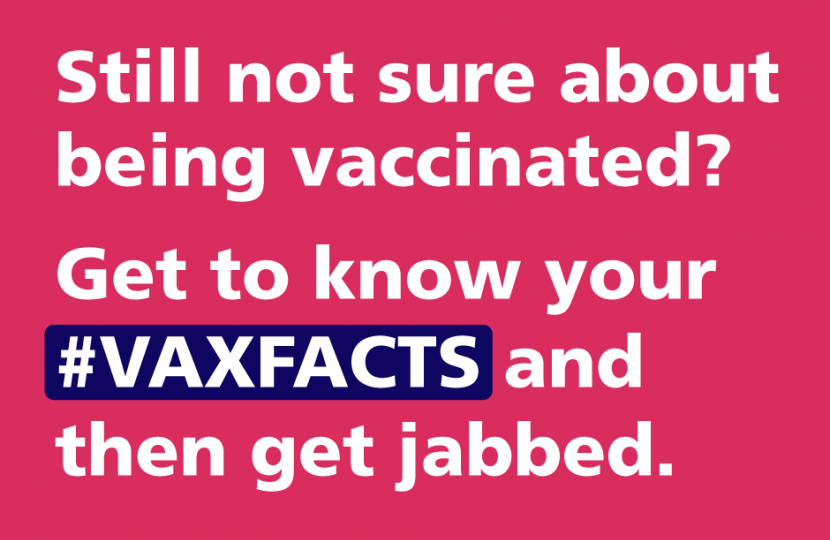
With so much information and misinformation about the COVID-19 vaccination circulating online, Norfolk and Waveney NHS has launched a new campaign aimed at people who have yet to get vaccinated or receive their second and booster jabs.
It will help dispel myths and layout the science so people can make a well-informed decision about their own health.
#VAXFACTS aims to share information from trusted sources which challenge some of the most common vaccination myths or misinformation to help people distinguish fact from fiction.
- Hospitalisations: Recent data published by UKHSA shows just how important it is to get the jab, with people who have not been vaccinated being up to 8 times more likely to be hospitalised with COVID-19 and the booster vaccine was shown to be 88% effective in preventing people from ending up in hospital due to Omicron.
- Vaccines and Omicron: While 2 doses of a COVID-19 vaccine provides strong protection against the Delta variant, data from the UKHSA shows 2 doses is not enough to protect people from Omicron – but a third dose, a booster, provides around 70% protection against symptomatic infection from Omicron 2 to 4 weeks after the booster is given.
- Long Covid: According to the latest ONS figures, 1.3 million people in UK reported suffering from long COVID. Fatigue is the most common symptom reported in people experiencing long COVID, followed by loss of smell, shortness of breath and difficulty concentrating. 20% of these people reported that long COVID 20% limited their daily activities "a lot".
- Blood clots: You’ve probably heard reports about a link between the AstraZeneca vaccine and blood clots. More specifically, a rare type of blood clot called CVT (cerebral venous thrombosis) that has been happening along with low blood platelets. Research is still looking into this. But at this time, these incidents appear to be extremely rare. In fact, having COVID-19 probably puts you at a far higher risk of CVT than being vaccinated, according to researchers at the University of Oxford. Putting it into perspective: you probably have more chance of getting a dangerous blood clot from taking a four-hour flight, than from having CVT from a COVID-19 vaccine.
- Fertility: The Royal College of Gynaecologists and the Royal College of Midwives have stated that there’s no known way COVID-19 vaccines could affect fertility or evidence to suggest that COVID-19 vaccines can cause harm to pregnant women or their babies.
- DNA: Rumours suggesting that COVID-19 vaccines can affect your DNA are not true. The Pfizer-BioNTech and Moderna vaccines contain messenger RNA (mRNA) which give instructions to your cells to make proteins found on the surface of the virus that causes COVID-19, which your body creates antibodies against. This usually leads to immunity. The mRNA usually stays in your body for a few days, before being broken down and removed by the body. It cannot influence or affect your DNA at all.
- Antibodies from infection: Some people think if an antibody test shows they’ve had COVID-19 before, then they don’t need to have a vaccine. This is wrong for several reasons: you can be reinfected with COVID-19 after having it once, we don’t know how long immunity lasts and we don’t know how strong that protection is while it lasts.
- Vaccines contain animal products: The three COVID-19 vaccines approved in the UK do not contain any animal products. You can read lists of the ingredients found in each of the vaccines on the Coronavirus Yellowcard website. Religious leaders and faith organisations have encouraged followers to have COVID-19 vaccinations including the British Islamic Medical Council, Hindu Council UKand the Board of Deputies of British Jews.
- What’s the point of having a vaccine if you still have to wear a mask or can catch Covid? Being vaccinated does not mean that you, or those around you, should be any less vigilant about following government COVID-19 guidance. No vaccine approved against COVID-19 is completely effective in every single case. We know that vaccines prevent people from being seriously ill from the infection, reduces the hospitalisations and the amount of people dying from coronavirus. The more people who are vaccinated reduced the burden on exhausted health services and reduces infection rates, so fewer people are sick and need to isolate which has a knock on effect on the community and the country’s infrastructure. To minimise disruption and infection risk as much as possible, it’s important that all of us keep washing our hands regularly and follow the latest government guidance.
For more information about coronavirus and vaccinations visit these verified and trustworthy sources:
https://www.gov.uk/coronavirus

